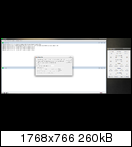Nun wollt ich fragen ob jemand das Programm benutzt , kennt oder sonst was darüber weiss und ob dieses Overclocking nicht n bissel übertrieben ist.
Es sieht so aus: ich wollte meinem Rechner "ein bisschen" mehr Power geben und dachte mir bevor ich selbst was rumschraube lass ich mal Auto Tuning drüber, dachte mir das wird schon wissen was gut ist.
Wie gesagt liess ich das mal laufen wobei der Rechner einmal neugestartet hat und am Ende funzte auch alles tip top (Rechner läuft auch jetzt noch einwandfrei)
Hardware Info:
Asus Maximus III Gene Motherboard
Intel i7 860 (2.8GHz) LGA 1156
2x2 GB DDR 3 RAM 1333Hz Clockable
Nunja um doch noch sicher zu gehen was da Asus genau gemacht hat hab ich mal im Bios nachgeguckt und gesehen das da steht:
Target Cpu Frequency : 3338 MHz Oo
DRAM Target Frequency: 1580 MHz
was ich doch für n bisschen Übertrieben hielt.
Schleunigst hab ich auch im Hardware Monitoring geguckt ob da schon was am schmoren ist,
war jedoch im grünen Bereich:
Vorher CPU Temperature : 42-46°C
PCH Temperature : 39°C
MB Temperature : 37°C
Nachher CPU Temperature : 56-59°C
PCH Temperature : 44°C
MB Temperature : 40°C
Clocking sieht jetz so aus:
BLCK Frequency : 158 MHz
CPU Voltage : 1.44375 V dynamic Voltage
DRAM Bus Voltage : 1.749 V "
IMC : 1.20575 V "
CPU PLL : 1.80200 V
PCH : 1.07325 V
Naja wie schon gesagt läuft alles ohne jegliche Probleme weshalb ich Einstellungen beibehielt, würd jetzt gern wissen was ihr davon haltet und ob das nicht schädlich für den rechner ist denn ich hab noch nicht grosse Erfahrung in dem Bereich.
Danke für Feedback
MfG

 Hilfe
Hilfe
 Neues Thema
Neues Thema Antworten
Antworten

 Nach oben
Nach oben






